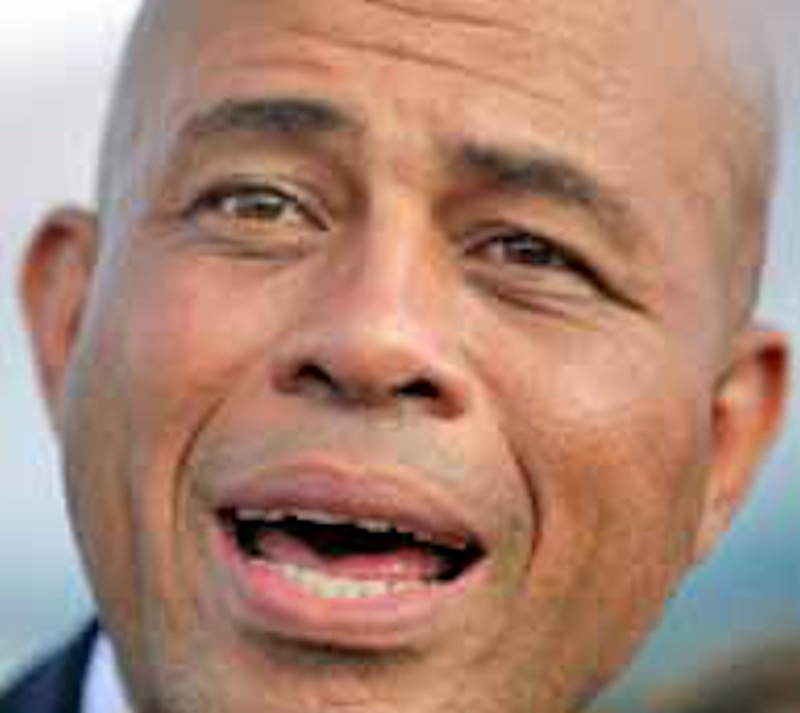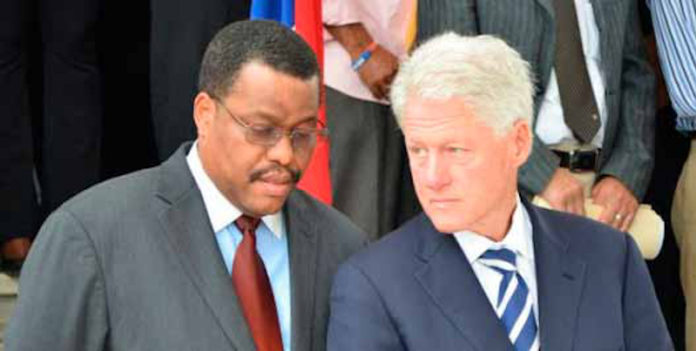The sudden Feb. 24 resignation of Haitian Prime Minister Garry Conille is just the latest episode in a sharpening class struggle for political power between three sectors: Washington, the neo-Duvalierists, and the Haitian masses.
Conille, a medical doctor and formerly one of UN Special Envoy to Haiti Bill Clinton’s chiefs of staff, was imposed as Prime Minister on President Michel Martelly last October by Washington. He was a “technocrat” similar to his immediate predecessor, Jean-Max Bellerive, former President René Préval’s last prime minister. Both men are knock-offs of Bellerive’s mentor, Marc Bazin, a former World Bank economist who was imposed as Finance Minister on Jean-Claude “Baby Doc” Duvalier in 1982. Washington had sent Bazin – dubbed at the time “Mr. Clean” – to rein in rampant Duvalierist corruption, which was siphoning off, into Swiss bank accounts, millions of dollars from U.S. and international financial institution (IFI) aid packages sent to build infrastructure to service North American corporate interests, principally cheap-labor assembly industries. But, after only six months of house-cleaning, Bazin was forced to resign, much like Conille.
Martelly’s clique – whose chefs de file are Foreign Minister Laurent Lamothe and Interior Minister Thierry Mayard-Paul – represents a resurgent neo-Duvalierist sector, which has a different agenda than the servile technocrats. They seek to establish Haiti as a sort of chasse gardée for their business interests and corruption, rejecting oversight by Washington and the IFIs. This was the model of their fathers, who were by and large prominent Duvalierists, the political representatives of Haiti’s grandons, or big landowners.
François “Papa Doc” Duvalier and his son often had a prickly relationship with Washington during their 29 year dictatorship (1957-1986), not because of any progressive tilt, but because their economic base – the grandon class, as direct exploiters of the peasantry – was independent of, and to some extent in conflict with, U.S. capitalist interests.

Although Washington facilitated Papa Doc’s electoral victory in 1957 (just as it did Martelly’s in 2011), Papa Doc – a student of Machiavelli’s handbook on political intrigue, The Prince – began to veer away from Washington’s control soon after coming to power.
In 1962, Washington sent a small U.S. Marine force to exercise, train, and beef up the Haitian Army (which had been its proxy since the end of the 1915-1934 U.S. military occupation) in an effort to intimidate and reassert control over their unruly pawn. Instead, Duvalier used the military aid to reinforce his Volunteers for National Security (VSN), better known as the “Tonton Macoutes” or Uncle Knapsack, a folklore figure who carries off children in the night. Duvalier subdued the Haitian Army (later Macoutizing it) and expelled the U.S. troops, earning him the enmity of the Kennedy and Johnson administrations.
Papa Doc and, to a slightly lesser extent, his son assumed a faux nationalist stance, in essence telling Washington that they were in charge of this neo-colony (although they’d share the spoils for a price) and would run it as they saw fit. The result was an uneasy alliance, because Washington needed and valued the Duvaliers’ fierce anti-communist purges and posture as a bulwark against the revolution in neighboring Cuba.
Martelly is trying to replay some of Duvaliers’ tactics, working to re-establish the Macoutized Army and flirting with the Venezuela-led ALBA alliance, much as Papa Doc would get his way by threatening Washington that he might ally with Cuba. (An ALBA meeting is scheduled to take place in Jacmel on Mar. 2-3).
Washington and its allies stopped short of publicly scolding Martelly for Conille’s removal but made their strong disapproval clear. The U.S. Embassy bemoaned the loss of Conille’s “perspicacity and energy” which he “devoted to the betterment of the Haitian people’s living conditions.” Canadian Foreign Minister John Baird said that “Canada deeply regrets” Conille’s resignation, which meant the loss of “a competent leader, a friend of Canada, and a man who embodies hope,” saying it would “increase instability” in Haiti. UN Secretary General Ban Ki-moon expressed “concern” about the resignation, while the Chilean head of the UN Mission to Stabilize Haiti (MINUSTAH) Mariano Fernández Amunátegui said that “the resignation of Dr. Garry Conille shows, unfortunately, that rifts have overtaken reconciliation to the detriment of the country.”
Pastor Edouard Paultre of the Haitian Council of Non-State Actors (CONHANE) is an unofficial Haitian mouthpiece of “the international community.” He expressed more forthrightly what the diplomats did not. “The Prime Minister resigned because of big cases of corruption,” he said. “We are faced with a power which does not really want to fight corruption in the country.”
Martelly has been infiltrating former Army officers, policemen, and death-squad paramilitaries into the state intelligence and security apparatus.
Meanwhile, the Haitian masses watch the spectacle of this imperialist/Duvalierist rivalry with a combination of glee and dread, fearing the repression which may be unleashed. Haitian grassroots groups have held demonstrations and press conferences several times weekly to denounce, among other things, the continuing UN military occupation of Haiti, the relaunch of the Haitian Army (which is informally training and rearming in camps nationwide), and Martelly’s non-prosecution of Baby Doc for crimes against humanity (the former “President for Life” has been back in Haiti since January 2011).
On Feb. 17, just before Carnival, students clashed with pro-Martelly goons when the president crashed an international conference at the State University’s Ethnology School. Several students were wounded and arrested, while the goons smashed car windshields and university property.
The fiercest attacks dogging Martelly are being led by Senator Moïse Jean-Charles, a firebrand former peasant organizer allied with former President Jean-Bertrand Aristide’s Lavalas Family. Despite Aristide’s extremely low public profile since his return from a seven-year exile last March (he has never even left his home), the party remains, 16 years after its founding, the foremost political voice and hope of the Haitian masses.
Moïse, along with a growing alliance of parliamentarians, has charged Martelly, his family, and his clique with a wide array of corrupt practices, from $20,000 per diem expense accounts on frequent trips to the brazen embezzlement of funds for phantom projects from the state bank (see Haïti Liberté, Vol. 5, No. 25, 1/4/2012).
But Moïse’s most persistent, and politically lethal, charge is that Martelly is (or was) a U.S. citizen, which, if true, would be a flagrant violation of the 1987 Haitian Constitution and open the president up for impeachment.
Last week, Moïse wrested back control of the Senate Commission investigating Martelly’s nationality (and that of 39 other high government officials) from two Martelly allies – Senators Joseph Lambert and Youri Latortue – who had been impeding the investigation.
Martelly has been infiltrating former Army officers, policemen, and death-squad paramilitaries into the state intelligence and security apparatus, while assembling in Florida a “hit team” to eliminate troublesome parliamentarians, according to one inside source (see Haïti Liberté, Vol. 5, No. 31, 2/15/2012).
The volatility of this three-way scrimmage was evidenced this week when rumors began on Feb. 25 that the Martelly government had issued a warrant to arrest Aristide and eight others on a collection of corruption and drug trafficking charges that were concocted in 2004 by the post-coup de facto regime. Popular outrage was swift and loud. Radio call-in shows were dominated by irate listeners, and the giant Port-au-Prince slum of Cité Soleil saw hundreds mobilize on the night of Feb. 27. That same evening, the Justice Ministry issued a “formal denial” of the “fanciful rumors” that the government had issued warrants for Aristide’s arrest.
While Washington and the neo-Duvalierists have their differences, they agree on one thing: the Haitian masses in general, and the Lavalas Party in particular, must not hold political power. This is where the danger lies.
If Sen. Moïse and his parliamentary allies are successful in dislodging Martelly (which might only push the besieged president to use the repressive forces he’s arrayed), it might lead to early elections, which the newly reorganizing Lavalas Family could be well positioned to win, as they’ve won all electoral contests in which they’ve ever participated. (The party had been banned from elections since the 2004 coup.)
Herein lies Washington’s dilemma: should it help to push out an increasingly mercurial Martelly if it might set the stage for the Lavalas Family, and the Haitian masses, from regaining some measure of political power?
The U.S. may have hoped that Martelly would publish Haiti’s amended Constitution (as Conille and Paultre had urged), whereby the Prime Minister would assume the Presidency in the event of a presidential vacancy (the Supreme Court head steps in under the 1987 charter). But now Conille is out of the picture (although he remains acting PM until his replacement is named). Martelly has proposed three of his closest aides to fill the post: Lamothe, Mayard-Paul, and Anne Valérie Timothée Milfort, his appointee to the Interim Haiti Recovery Commission (IHRC). That agency, which was co-headed by Bill Clinton, saw its mandate expire in October, and it has not been renewed, another neo-Duvalierist foot-drag that irks Washington.
Finally, MINUSTAH, the principal enforcer of Washington’s agenda in this high-stakes political game, sees its existence threatened. UN officials have said they need until 2016 to create a “secure and stable environment” in Haiti. However, the neo-Duvalierists want to supplant the UN troops with their own Macoutized force, while the Haitian masses want UN troops out immediately, principally because in October 2010 UN Nepalese troops inadvertently imported cholera, starting an epidemic which has now killed over 7,000 and sickened over half a million. There are also almost monthly cases of UN soldiers sexually assaulting Haitian minors, all of which have gone unprosecuted.
MINUSTAH’s increasingly tenuous position and Martelly’s increasingly erratic behavior prompted the entire UN Security Council to make an unprecedented visit to Haiti from Feb. 13-16. Tellingly, the delegation was led by U.S. Ambassador to the UN Susan Rice rather than (as protocol would dictate) the Council’s President, who during February was the Togolese Ambassador.
Haiti has seen this troubled scenario before. In 1986, Washington helped push Baby Doc out of power, confident that it could buy ensuing elections and insert their chosen candidate, Marc Bazin, in the presidency. Untarnished elections couldn’t be held until 1990, when the technocrat Bazin’s main opponent appeared to be a feared Duvalierist and former leader of the Tonton Macoutes, Roger Lafontant, who was later disqualified. Washington thought it had the election in the bag.
But the strategy foundered when a parish priest from a Haitian slum, Father Jean-Bertrand Aristide, entered the race at the last minute, winning with 67% of the vote against Bazin’s 14%, despite being outspent by a factor of 72 to one.
In short, Washington learned the hard way the meaning of the Haitian proverb, Ayiti se tè glise. Haiti is slippery ground.










